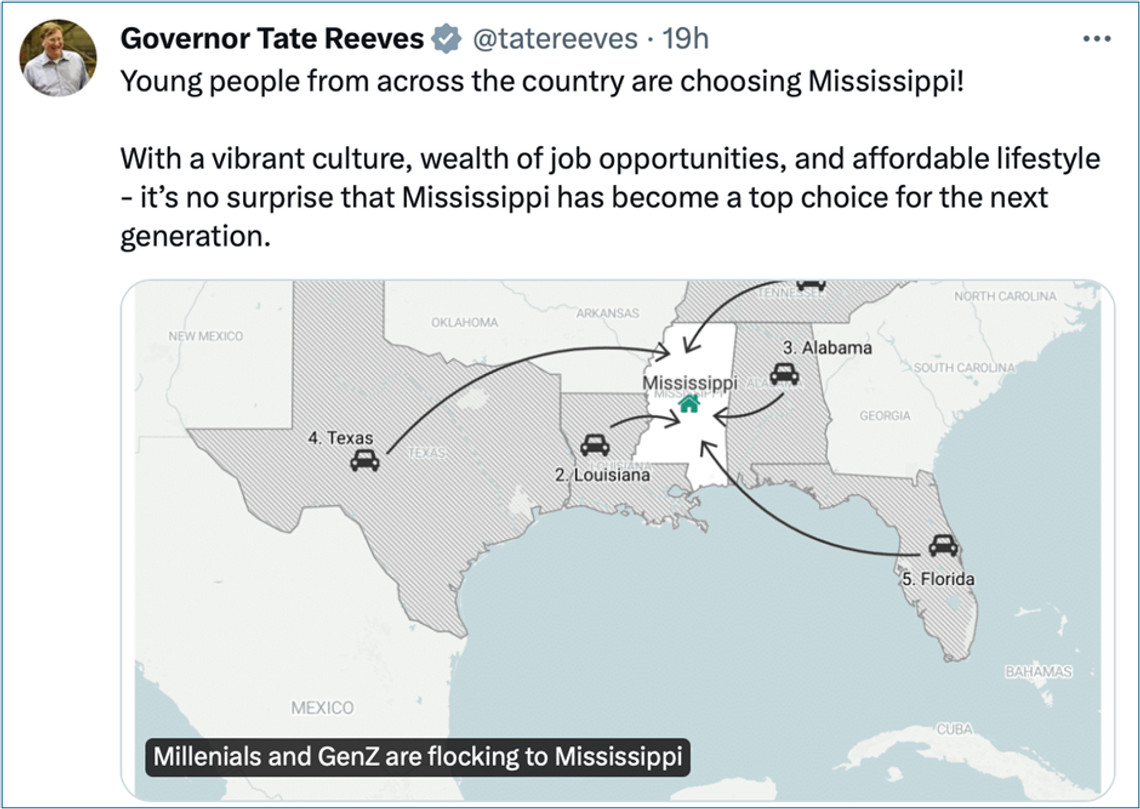By Douglas Carswell
Not enough people in Mississippi work. Out of every 100 working age adults in our state, 46 are not in the labor force.
Nearly half of working age Mississippians are not in formal employment – and they aren’t actively looking for employment either.
At the same time, there are a record number of jobs available. According to the US Bureau of Labor Statistics, in October last year there were 80,000 unfilled jobs across the state.
Not only are there lots of jobs available in Mississippi, but according to new research a record number of people are now moving to Mississippi to take up those opportunities. 2022 saw a net inflow of 12,000 (often young) people to our state, coming largely from Tennessee, Louisiana, Alabama, Texas and Florida.
A combination of labor market deregulation, inward investment and tax cuts seems to be transforming Mississippi for the better. Our state is no longer a place that people leave, but somewhere people move to in search of new opportunities. What can we do to ensure that more people in Mississippi take full advantage of those job opportunities?
It is not enough to merely talk about opportunities. With 80,000 job vacancies right here, right now, there are opportunities to work all around us. The issue is why some folk aren’t taking the opportunities that are there.
Some have suggested that we hire more career counsellors in high schools. I am certain that career counsellors do a wonderful job, but if that is the only policy solution, I suspect labor force participation will remain low.
If we are going to increase workforce participation, we need to ask difficult questions about welfare. Does welfare create disincentives against work?
Mississippi has a population of 2.95 million. Approximately one in five (19 percent) live below the poverty line (calculated as the minimum income needed to get by with the bare essentials.)
The way in which the myriad of assistance programs impacts the half a million plus people below the poverty line matters, and needs to be properly understood if we are to improve workforce participation.
Welfare programs can have unintended consequences, and one of them is the creation of so-called ‘benefit cliffs’. A benefit cliff is what happens when someone loses benefits if their income increases, but the benefits they lose outweigh the additional income gained.
Given the maximum income thresholds allowed, we know, for example, that if someone’s monthly income went from $400 a month to $410 a month, they would no longer qualify for some Temporary Assistance programs.
If your income rose above $1,215 a month, you could lose the right to claim Supplemental Nutrition Assistance Program (SNAP). When your income per person goes over $19,392 a year, you may no longer qualify for Medicaid (although the ‘cliff’ cut-off is not always as abrupt as is sometimes supposed).
Take into account the different benefit cliffs, and you could have a powerful range of disincentives.
Even if a person was notionally better off when holding down a 35 hour week job, the time and effort it would take for a relatively modest increase in income might leave some feeling having a job was not worth it.
It has been suggested that benefits do not create a problem of ‘cliffs’, but of straight forward dependency. They point out, for example, that those on food stamps are not those hovering on the edge of the labor market, but full-time welfare dependents. There may be some truth in that, too.
So, what is the solution?
The answer to benefit ‘cliffs’ is not to increase welfare payments in order to remove disincentives, but to institute more stringent work requirements for those on welfare programs.
In Arkansas under Sarah Huckabee Sanders, anyone that fails to accept a suitable job within five days of being offered one, or who fails to show up for job interviews without notice, can now lose their benefits.
If we are serious about increasing workforce participation, we may well need to implement something similar.
Douglas Carswell is the President & CEO of the Mississippi Center for Public Policy
.png)

Comment
Comments